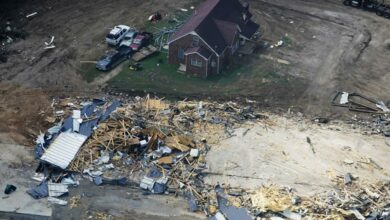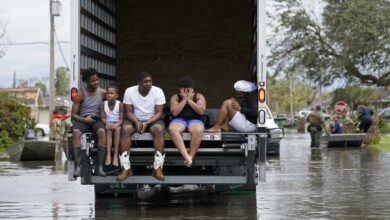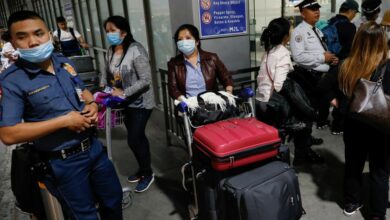The death toll from the Philippines' strongest typhoon this year rose on Wednesday to around 230, with hundreds missing in landslides and floodwaters, as the storm continued its destructive path across the island nation.
Typhoon Bopha, with central winds of 120 kph (75 mph) and gusts of up to 150 kph (93 mph), battered beach resorts and dive spots in northern Palawan on Wednesday, but there was little damage as the storm began to weaken.
Hardest hit were the coastal, farming and mining towns in the southern Mindanao region, where Bopha made landfall on Tuesday, destroying homes, causing landslides and flash flooding and killing at least 230 people.
Arthur Uy, governor of the worst-hit province Compostela Valley in Mindanao, said raging water and mud from the mountains swept through school buildings, covered courts, town halls, and health centers where residents had taken shelter. The death toll in the province stood at 150.
“The waters came so suddenly and unexpectedly, and the winds were so fierce, that compounded the loss of lives and livelihood,” Uy told Reuters in a telephone interview.
He said water catchment basins for farms on top of the mountains gave way due to the torrential rains, sending down heavy volumes of water to the flatlands.
Damage to agriculture and infrastructure in Compostela Valley province could reach at least 4 billion pesos (US$98 million), with the typhoon destroying 70-80 percent of plantations, mostly bananas for export, Uy said.
About 60 people died in the municipality of New Bataan alone and around 245 were still missing, Uy said, adding the area was initially cut off by road blocks. Communications were down and power had yet to be restored in the area.
“The last thing my mother said was 'I love you,’” said Julius Rebucas, whose mother and brother were caught in flash floods in Compostela Valley.
“It's sad because I no longer have a family.”
About 20 typhoons hit the Philippines annually, often causing death and destruction. Typhoon Washi killed 1,500 people in Mindanao, also in December last year.
Buried under mud
An army outpost in Compostela Valley was buried by torrents of mud and water. One soldier died and five others are missing.
Major-General Ariel Bernardo, an army division commander, said two dozen people had been pulled from under layers of mud and were being treated in local hospitals.
Video showed dozens of bloodied survivors, their faces covered with thickly caked mud, at a shelter in the province.
“In the town of Nabunturan, our farms were totally wiped out, there was flooding in every barangay (village),” said police Major Hector Grijaldo.
Coastal areas in Davao Oriental province also bore the brunt of Bopha's fierce winds and rain, with 81 people confirmed dead in six towns, the provincial disaster agency said.
Rommil Mitra, police chief of Davao Oriental, said 52 people were reported killed in Boston and Cateel towns, most of them crushed by fallen trees, collapsed homes and flying debris.
“The winds were really very strong,” Mitra said. “I was told the force of the wind could even lift an army truck loaded with troops from the ground.”
Most of the affected areas remained isolated due to power outages, lack of communications and destroyed roads and bridges. Helicopters were ferrying troops in search and rescue operations.
Thousands of people remained in temporary shelter areas as local officials appealed for food, water and warm clothes for displaced families. Schools remained closed and dozens of domestic flights were suspended on Wednesday.




